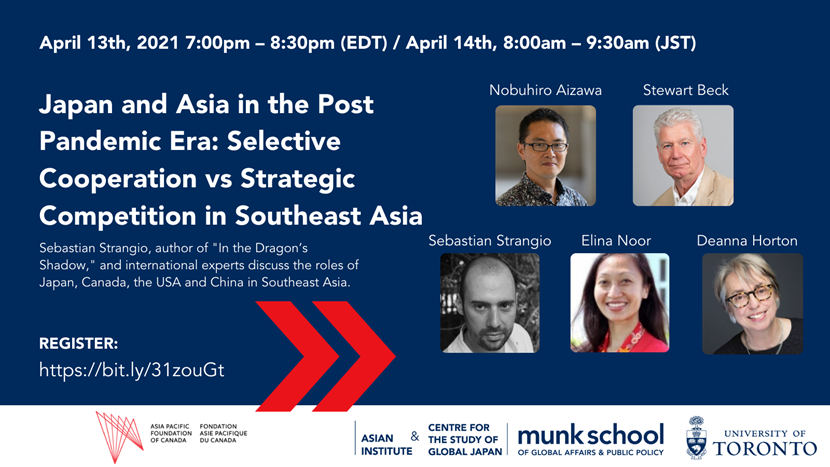This program is organized by THE CENTRE FOR THE STUDY OF GLOBAL JAPAN.

In his book, In the Dragon’s Shadow, The Diplomat editor Sebastian Strangio talks about the challenges for Southeast Asia in managing the rise of China. Do Japan’s longstanding ties to the region—including as its largest infrastructure investor– stand it in good stead to provide a counterweight to China? And what can Canada learn from Japan in its approach to this important region? Join Strangio and a panel of international experts to discuss the roles of Japan, Canada, the USA and China in Southeast Asia.
Speaker Bios:
Sebastian Strangio is Southeast Asia Editor at The Diplomat. In 2008, he began his career as a reporter at The Phnom Penh Post in Cambodia, and has since traveled and reported extensively across Southeast Asia, paying special attention to the impact of China’s growing power. Sebastian’s writing has appeared in leading publications including Foreign Affairs, the Los Angeles Review of Books, The Atlantic, and The New York Times. He is also the author of Hun Sen’s Cambodia (Yale, 2014), a path-breaking examination of Cambodia since the fall of the Khmer Rouge, and In the Dragon’s Shadow: Southeast Asia in the Chinese Century (Yale, 2020).
*More information: http://www.sebastianstrangio.com
Nobuhiro Aizawa is Associate Professor of Graduate School of Social and Cultural Studies, Kyushu University. He is the author of ‘Beyond the Non-Interference Dilemma: The Indonesian Initiative on ASEAN Charter, Nargis Crisis and Regionalism’, Australian Journal of Politics and History: Volume 65, Number 3, 2019. The Ethnic Chinese and the State: Indonesia’s China/Chinese Problem (in Japanese) (Shoseki Kobo- Hayama, 2010). He has been a Wilson Center Japan Scholar, a Visiting Scholar at Thammasat University, Chulalongkorn University and Cornell University. He is a former Research Associate at the Institution of Development Economies-JETRO, National Graduate Institute of Policy Studies and a member of Project 2045: A Joint Project of Two Maritime Democracies Indonesia-Japan.
Stewart Beck is the President and CEO of the Asia Pacific Foundation of Canada. Prior to joining APF Canada, Mr. Beck served as the Canadian High Commissioner to the Republic of India with concurrent accreditation to the Kingdom of Bhutan and to Nepal. He joined Canada’s Department of External Affairs and International Trade (now Global Affairs Canada) in 1982 and served abroad in the United States, Taiwan, and the People’s Republic of China. In Ottawa, he held a number of progressively more senior positions, including Director General of the North Asia Bureau, Director General Responsible for Senior Management and Rotational Assignments, and Assistant Deputy Minister for International Business Development, Investment, and Innovation. He was Consul General in Shanghai and prior to his posting to India, he was Consul General in San Francisco.
Elina Noor is Director, Political-Security Affairs and Deputy Director, Washington, D.C. Office at the Asia Society Policy Institute. A native of Malaysia, Elina’s work focuses on security developments in Southeast Asia, global governance and technology, and preventing/countering violent extremism. Previously, Elina was Associate Professor at the Daniel K. Inouye Asia-Pacific Center for Security Studies. Prior to that, she was Director, Foreign Policy and Security Studies at the Institute of Strategic and International Studies Malaysia. While there, she also served as the Secretary of the Council for Security Cooperation in the Asia Pacific, a 21-member Track Two regional security network. Between 2017 and 2019, Elina was a member of the Global Commission on the Stability of Cyberspace. She is also on the United Nations Office of Disarmament Affairs’ roster of experts, supporting efforts to build member states’ cyber-related capacity.
*More information: https://asiasociety.org/policy-institute/elina-noor
Deanna Horton is Senior Fellow at the Munk School of Global Affairs & Public Policy, University of Toronto. As part of her Canadian foreign service career, Deanna Horton spent a total of twelve years in Japan, including as Deputy Head of Mission, and also served as Ambassador to the Socialist Republic of Vietnam. She was a NAFTA negotiator, followed by two postings in Washington, most recently as Minister (Congressional, Public and Intergovernmental Affairs). As a Munk School Senior Fellow she has led a digital mapping project on Canada’s footprint in Asia (https://munkschool.utoronto.ca/canasiafootprint/) and related research on Canadian technology multinationals. Ms. Horton is also affiliated with the Asia Pacific Foundation of Canada, the Canadian Global Affairs Institute, and the Wilson Center in Washington, DC, commenting on economic and trade policy issues with a focus on Asia.
Please register from here: https://zoom.us/webinar/register/WN_zNwQQo_xT5eLOsI4dhqToQ.


